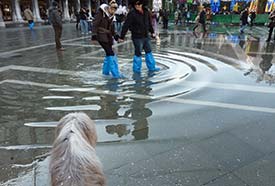|
Venice > Q&A > General questions
Venice Travel FAQ:
General Questions about
Venice
From:
Venice Travel FAQ

ABOVE: A dog watches a wading couple at the Piazza San Marco during acqua alta.
-
Can you give me an overview of
Venice?
See: Introducing
Venice, Italy.
-
Why is Venice a city of canals?
About 1,500 years ago, residents of the mainland fled to
islands in the Venetian Lagoon to escape barbarian invaders. Over time, they
built a city on 118 of the islands, and the gaps between the islands became
canals. Bridges were added later.
Until the mid-19th Century, Venice wasn't even connected to the
Italian mainland. (A railroad causeway finally was built in 1846, linking the
city to the shore--a distance of roughly 4 km or 2.5 miles.)
-
Is Venice really sinking?
Possibly, but not by much. The real problem is that sea levels
are rising. Fortunately, Venice is unlikely to become a modern-day Atlantis
before your visit.
-
Do I have to worry about flooding?
Only if you're on a tight schedule and can't stay high and dry
until the tide recedes. Venice's flooding, or acqua alta, occurs when a
combination of an unusually high tide, low atmospheric pressure, and southerly
winds forces an abnormal quantity of water into the Venetian Lagoon from the
Adriatic Sea. (This happens most often from fall through early spring.) The
water has nowhere to go, so it covers the pavement in low-lying areas of the
city for a few hours.

You're most likely to encounter acqua alta in the San
Marco area, where it isn't uncommon to see water oozing up through the drains in
St. Mark's Square at high tide.
For more information, see:
Acqua Alta
-
Do the locals speak English?
Some do, but many don't. (They're too busy juggling Italian and
Venetian dialect.) People who work in the tourist trade generally speak enough
English to communicate with visitors. If you can manage a few critical Italian
phrases like "Per favore," "Grazie," and "Dov'è la
toilette?", you'll do fine.
-
Where can I find public toilets?
Restaurants and larger bars should have toilets. Museums are a
good option. (At a few museums, such as Ca' Rezzonico, the lavatories are in
public areas where you can use them without paying admission.)
Clean municipal toilets are scattered around the city, but lines
can be long and fees are outrageous. For more information, see:
Venice's Public Toilets
-
Does Venice have self-service laundries?
Venice offers several launderettes, including one near the railroad station.
See: Venice Laundromats
-
Can I use my cellular phone or tablet in Venice?
Yes, if it's modern smartphone (or, alternatively, an old GSM
phone) and you've enabled roaming. But be careful if you're visiting from
overseas, because international roaming fees--especially for data--are often
painfully high.
If you're traveling with a smartphone or tablet, you can turn
off cellular service and use the municipal Wi-Fi network when you're walking
around the city. There's a modest daily fee, and coverage is limited
to major squares and the Grand Canal. (Save money by ordering Wi-Fi at least
seven days in advance.) See:
Venice Wi-Fi Network
Yes, but only in private quarters, and only if permitted by your
hotel or landlord.
In restaurants, bars, and other public areas, indoor
smoking is illegal--and even Italians, who aren't noted for respecting
authority, obey the rules.
Next page:
Planning a trip
About the author:
 Durant Imboden has
written about Venice, Italy since 1996.
He covered Venice and European travel at About.com for 4-1/2 years before launching
Europe for Visitors (including
Venice for Visitors) with Cheryl
Imboden in 2001. Durant Imboden has
written about Venice, Italy since 1996.
He covered Venice and European travel at About.com for 4-1/2 years before launching
Europe for Visitors (including
Venice for Visitors) with Cheryl
Imboden in 2001.
PC Magazine has called this "the premier visitors'
site for Venice, Italy." Over the years, it has helped more than 30 million
travelers. For more information, see About our site,
our Europe for Visitors
press clippings,
and
our reader testimonials.
|